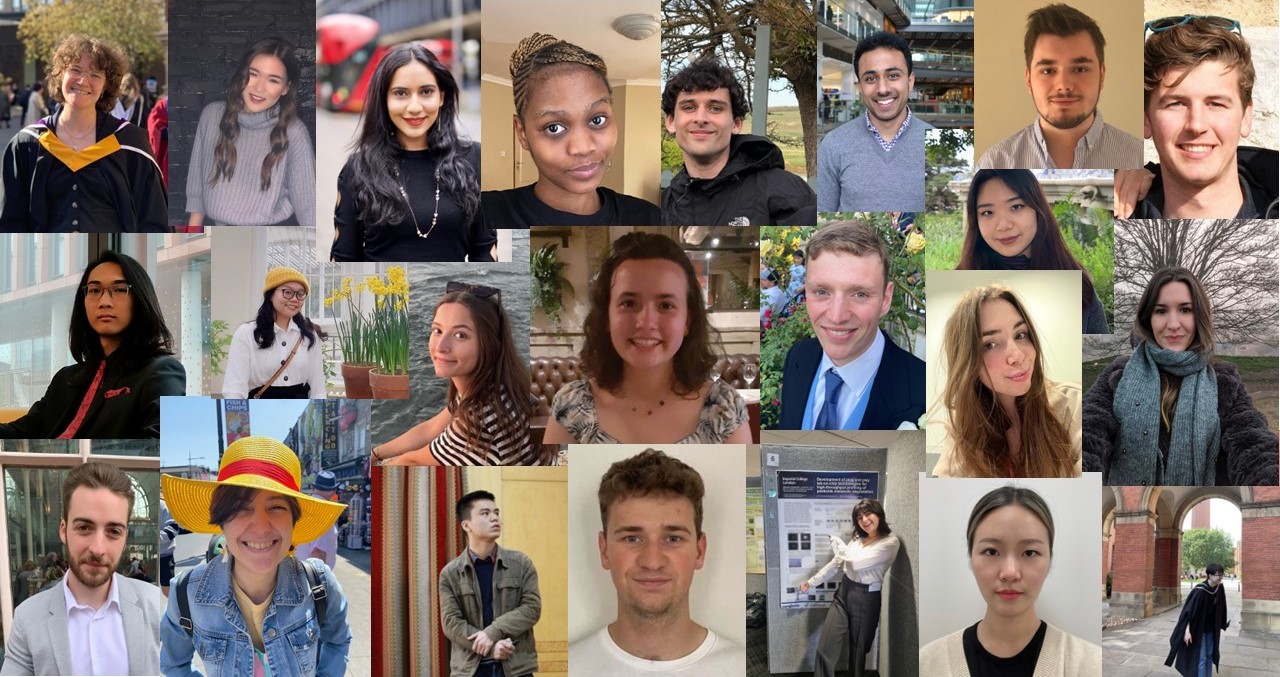
Our 2021 Student Profiles
- Siân Allerton
- Harry Beaven
- John Britton
- Sarah Chapman
- Yu Cheng
- Amalia Chrysostomou
- Gem Flint
- Shameem Golestaneh
- Abigail Iles
- Thomas Maher
- Niall McIntyre
- Maya Müller
- Matt White
- Abdul Zafar
- Yunfei Dang
- Davide Facchetti
- Xiaotong Lin
- Liquan Long
- Suchaya (Mint) Mahuttanatan
- Amina Nigmatulina
- Gaseitsiwe Lame Senatla
- Runxin Xu
- Shradda Vadodaria
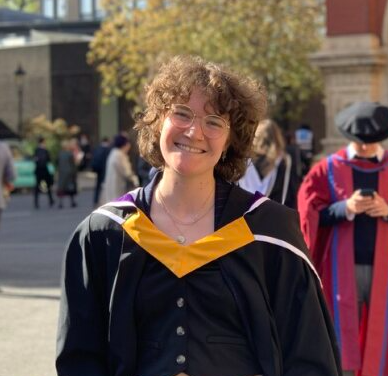 Name
Name
Siân Allerton
Project title
Structural and pathological consequences of alpha-synuclein/lipid membrane interactions
What were you doing before enrolling in the ICB CDT Programme?
I carried out my undergraduate degree in chemistry at Durham University and in my final year I completed an external masters project as part of the Koksch Group at the Freie Universität Berlin. There I focussed on the use of synthetic peptides as effective cell culture platforms.
Why did you choose to apply for your particular project?
I find the interface between physical and biology science very interesting and I love how my project combines these two fields to help understand the mechanisms behind Parkinson’s disease.
What are you looking forward to the most within the CDT programme?
I have really enjoyed the additional experiences the CDT has provided including a chance to visit the BBC Television Centre. It was a fab way to expand my understanding of science communication – an area I’m really interested in!
Please tell us a fun fact about yourself!
Pink and red is one of my favourite colour combos!
Name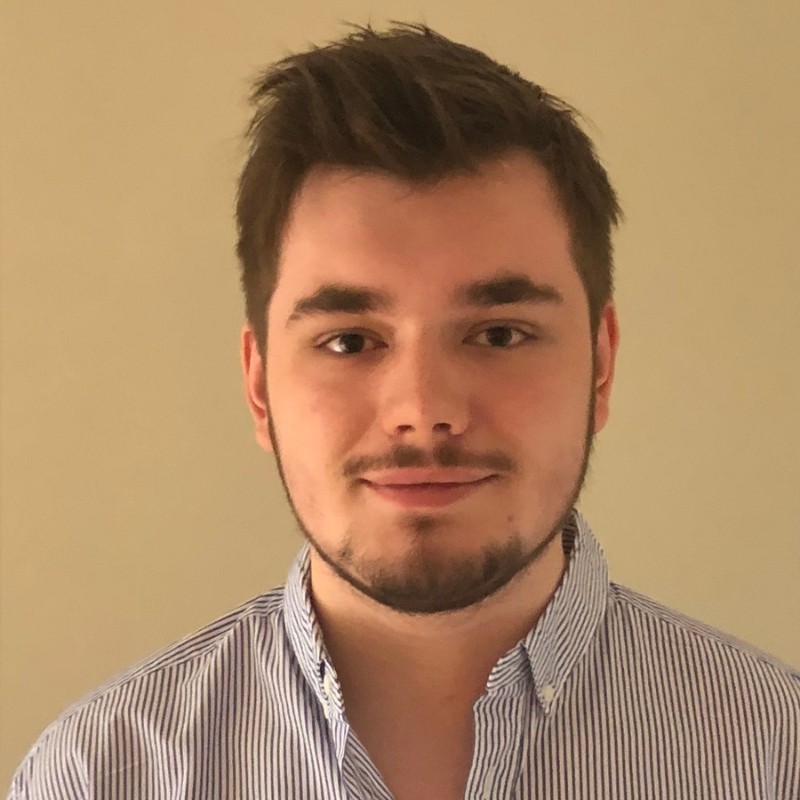
Harry Beaven
Project title
Communication within the membrane during complement activation
This project is jointly funded by the European Research Council and Institute of Chemical Biology EPSRC Centre for Doctoral Training
What were you doing before enrolling in the ICB CDT Programme?
I completed a BSc in Biochemistry at Imperial followed by an MRes in Systems and Synthetic Biology, also at Imperial. My research focused on understanding the expression dynamics of a bacterial RNA repair system.
Why did you choose to apply for your particular project?
I applied for this project as it combines my interests in biophysics and life sciences. The opportunity to work across both a structural biology lab as well as a biophysics lab and to be able to use these experimental techniques in an interdisciplinary research environment was exciting.
What are you looking forward to the most within the CDT programme?
I have really enjoyed the opportunities to collaborate with students with different research areas within the CDT. I have also enjoyed many of the opportunities provided by the CDT, such as access to the Advanced Hackspace. I am also looking forward to carrying out an EVOLVE placement.
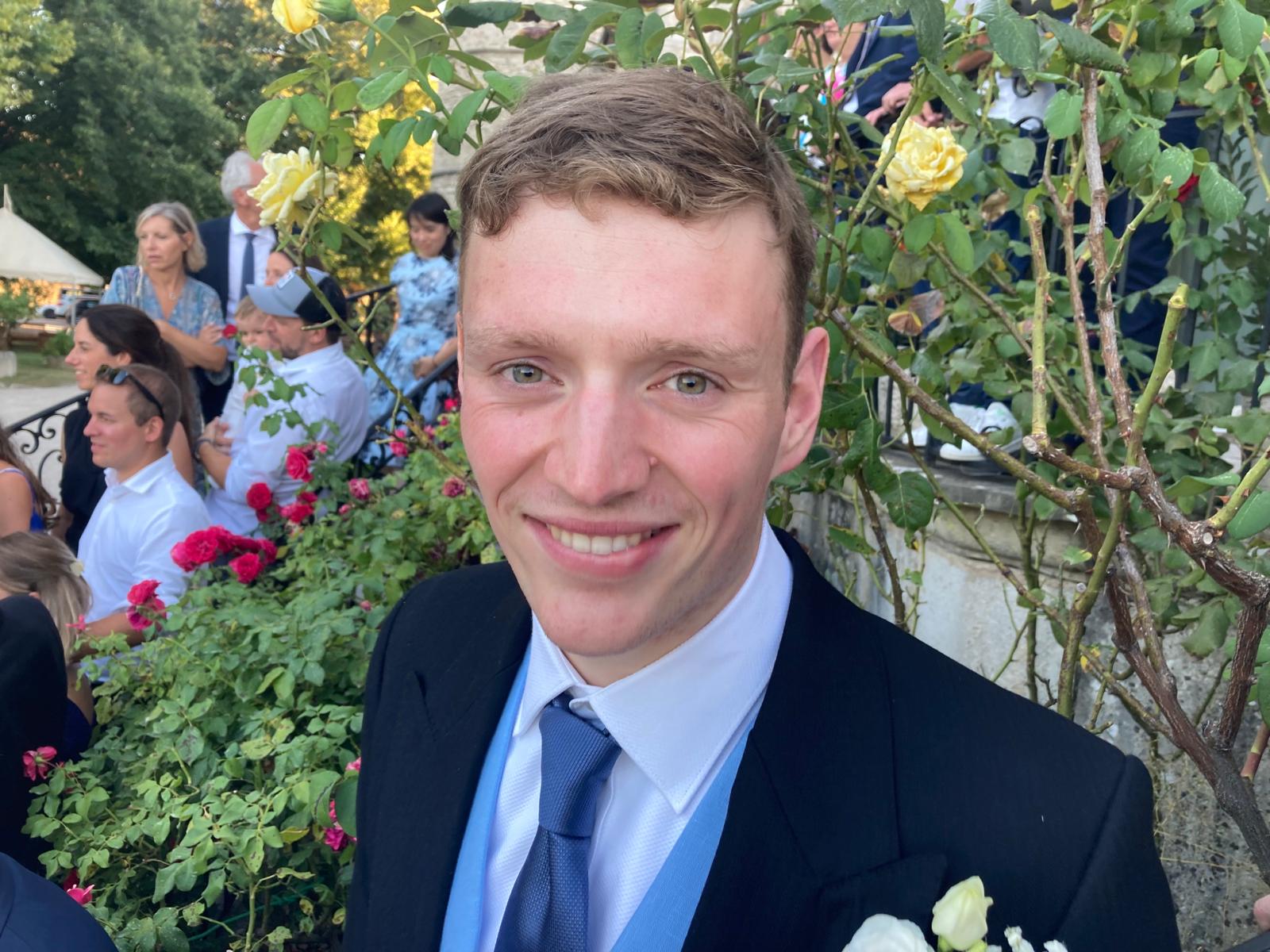 Name
Name
John Britton
Project Title
The effect of membrane asymmetry upon complex membrane proteins
What were you doing before enrolling in the ICB CDT Programme?
Prior to starting my PhD, I completed an integrated undergraduate masters at Imperial College finishing in 2020. During this time, I completed my masters project working on a project to comprehend how ionic liquids interacted with a skin mimetic with Professor Law’s group. I subsequently worked in education for a year whilst applying for PhDs.
Why did you choose to apply for your particular project?
During my MSci year at Imperial, I developed a strong interest in lipid membranes and their role in various diseases. I applied for various positions that examined the relationship between disease and membrane structure, but this project was particularly exciting, giving me the opportunity to push the boundaries in both artificial membrane formation and our understanding on respiratory complex I, whose disfunction is linked with a host of diseases such as Parkinson’s.
What are you looking forward to the most within the CDT programme?
Besides the project, I have enjoyed the opportunity to collaborate with students with a range of different projects and ideas, enabling me to widen my horizons and learn new techniques.
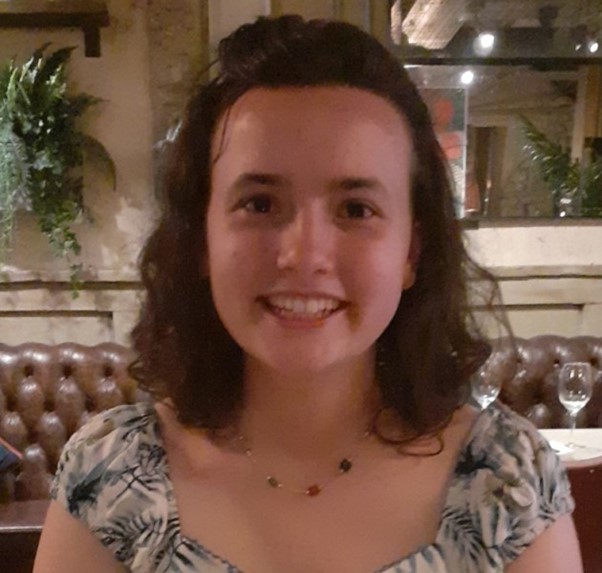 Name
Name
Sarah Chapman
Project title
Electrons, leaves, and light: investigating the surface photodegradation of agrochemicals
Co-sponsored by the Institute of Chemical Biology EPSRC Centre for Doctoral Training and Syngenta
What were you doing before enrolling in the ICB CDT Programme?
From the flatlands of Norfolk, I completed my MChem degree at the University of Manchester. In my final year, I was introduced to Electron Paramagnetic Resonance (EPR), and simulated Double Electron-Electron Resonance (DEER) spectra of multi-spin [3]- and [4]- rotaxanes to predict their structures in frozen solution (supervised by Prof. E. McInnes and Dr A. Bowen).
Why did you choose to apply for your particular project?
I’ve always found mechanistic study interesting, since it is so core to all of chemistry. In the final year of my undergraduate, I found a love for EPR as it gives a unique insight into many mechanisms through its direct detection of unpaired electrons. I realised the project was a particularly good opportunity when I saw that it was on a CDT programme and was also supported by an industry partner (Syngenta).
What are you looking forward to the most within the CDT programme?
I think the opportunities we have to explore different options for ourselves before we complete our PhD is great. In the CDT we hear about so many different areas that suit all different kinds of people, and we even get the chance to have a go while we complete our studies.
Please tell us a fun fact about yourself!
I play trumpet and piano, and have been known to make some of my own clothes!
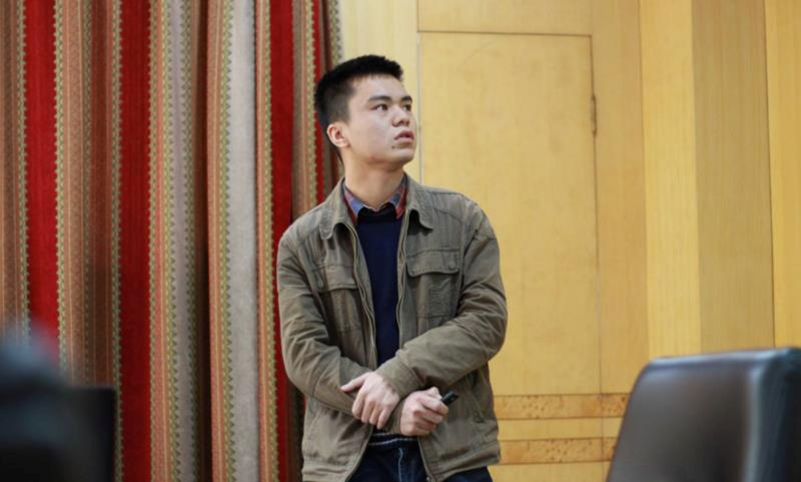 Name
Name
Yu Cheng
Project Title
3D bio-printing model tissues for targeted discovery in the agri-tech sector
This project is co-sponsored by Syngenta and co-supervised by its experienced industrial researchers.
What were you doing before enrolling in the ICB CDT Programme?
Teaching High school mathematics.
Why did you choose to apply for your particular project?
I am thrilled to participate in the practical application of laboratory technologies to address industrial demands. The project encompasses diverse areas such as membrane biophysics, 3D bioprinting, advanced manufacturing, and synthetic biology. Given my broad scientific interests, I am particularly passionate about contributing to this interdisciplinary project. My previous experience collaborating with Imperial supervisors during my MRes project was highly rewarding. I value the group atmosphere and the research culture within the department.
What are you looking forward to the most within the CDT programme?
Find out some new things, no matter how small or how useless they could be.
Solve some existing problems, no matter how insignificant there are.
Build a better self through accepting all kinds of uncertainties, experiencing 99% failure and keeping 1% hope forever.
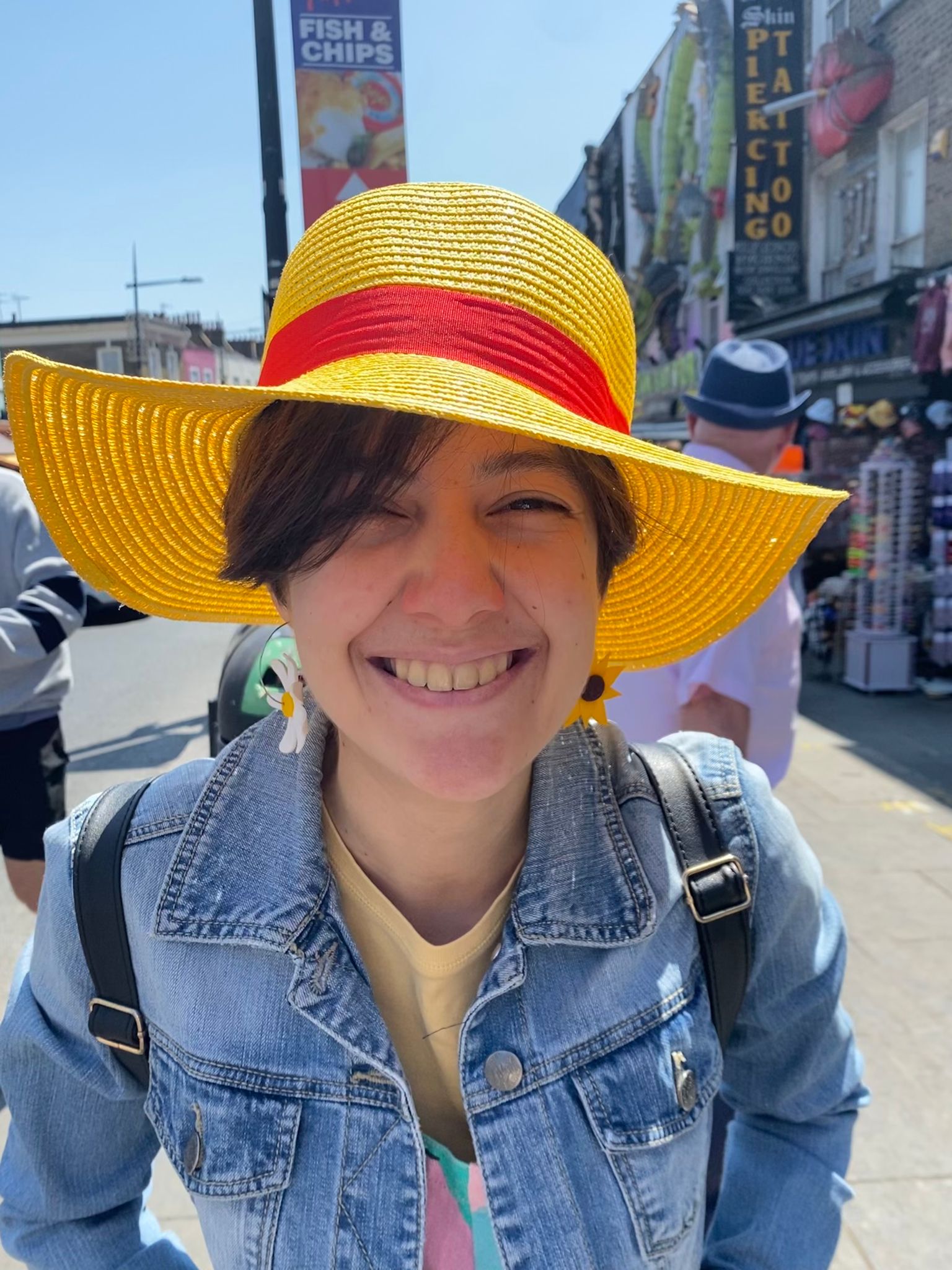 Name
Name
Amalia Chrysostomou (she/her)
Project Title
Composite hydrogels for in vitro culture of ovarian follicles
What were you doing before enrolling in the ICB CDT Programme?
I did my undergraduate degree in Mechanical Engineering at the University of Cyprus, I chose it because since school I really liked making things. While I was finishing my studies I found out that I was really interested in biological applications of engineering so I applied and got into a MSc program in Biomedical Engineering at Imperial College. Even though I now find myself in a Chemical Biology CDT I still consider myself an engineer at heart and throughout all my projects and research experiences outside university what intrigued me was how can we actually make the theory a real thing.
Why did you choose to apply for your particular project?
I chose to apply for this project because I found biomaterials fascinating and a fast-growing field. Also, as a woman I recognise the importance of developing more accurate models to study the ovary especially with diseases such as PCOS being so prevalent in society. I was also quite keen to apply for a project in a CDT program as I was very interested in the aspects of it that were outside the academic work.
What are you looking forward to the most within the CDT programme?
My favourite thing about the CDT so far has definitely been the different trainings that we do every year that give us an insight of how we could use our scientific knowledge to apply it in other fields like communicating with the public or developing our own business models.
Please tell us a fun fact about yourself!
Even though I work in the lab almost every day, dancing is my true passion and what I believe is the best way to express myself. Currently I’m into UK jazz dance!
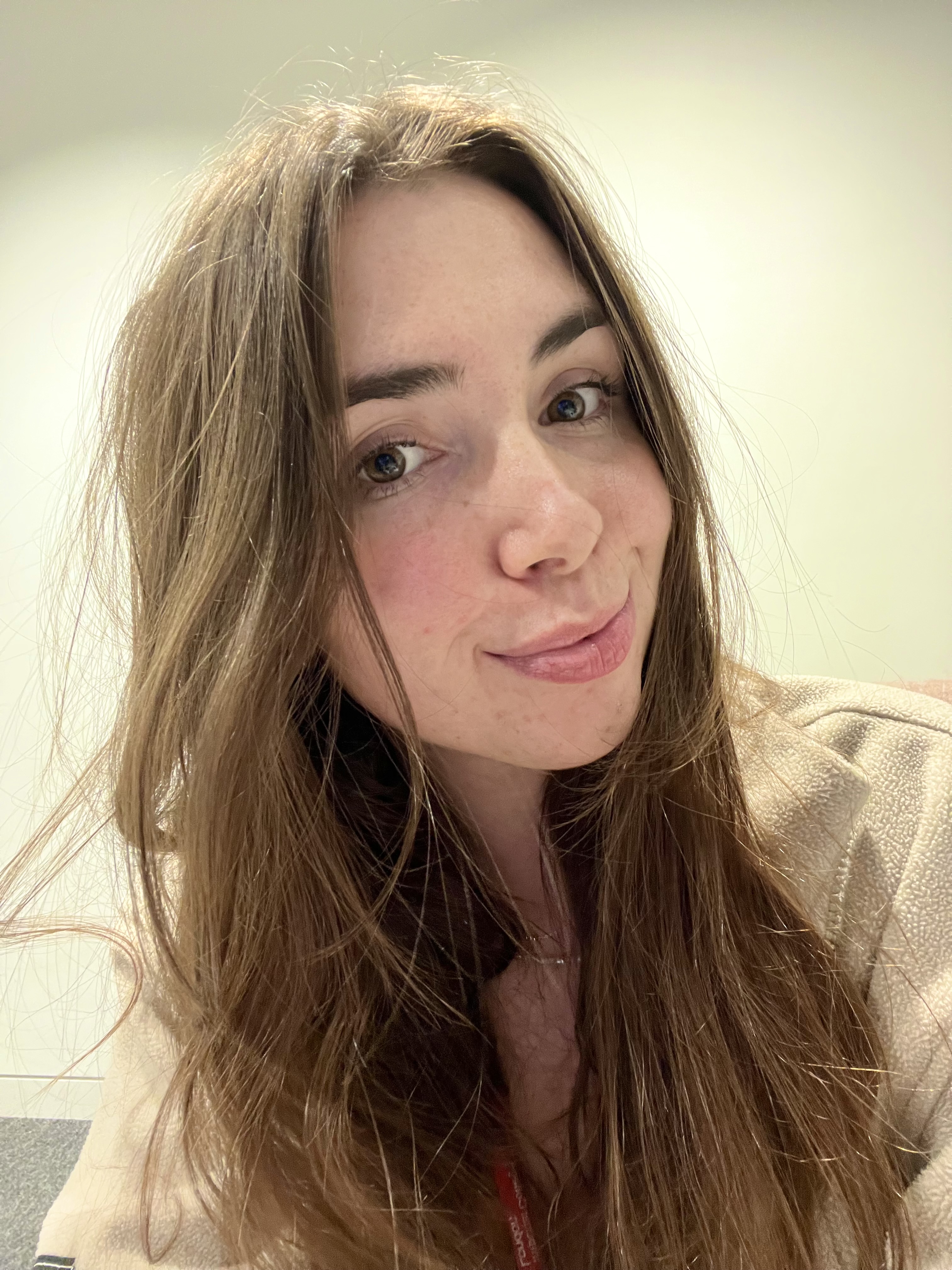 Name
Name
Gem Flint
Project Title
Targeting G-quadruplexes to overcome resistance to PARP inhibitors
This project is jointly funded by the CRUK Imperial Centre and Institute of Chemical Biology EPSRC Centre for Doctoral Training as a 4 year PhD
What were you doing before enrolling in the ICB CDT Programme?
Before joining Imperial, I completed my MSci Biomedical Sciences at University of Southampton. My master’s project was under the supervision of Dr David Rusling, investigating the use of nucleobase analogues to improve the stability of antiparallel triplex oligonucleotides.
Why did you choose to apply for your particular project?
The project encompasses all of my areas of interest that I had developed during my undergraduate studies. It is co-funded by Cancer Research UK, which is a charity close to my heart, that I’ve always wanted to help in any way I can. Being part of a collaborative CDT, as opposed to a standalone project also appealed to me as I am a person who works best in a collaborative environment.
What are you looking forward to the most within the CDT programme?
I am most looking forward to the ‘Science communication with the BBC’ course to get expert advice on how to connect with the public in an engaging way about what we are doing in our research. I think this is an important aspect of research which is often overlooked, yet it is essential in gaining the trust and support of the public.
Please tell us a fun fact about yourself!
I ran the London marathon for CRUK in 2022 and raised over £2,400!
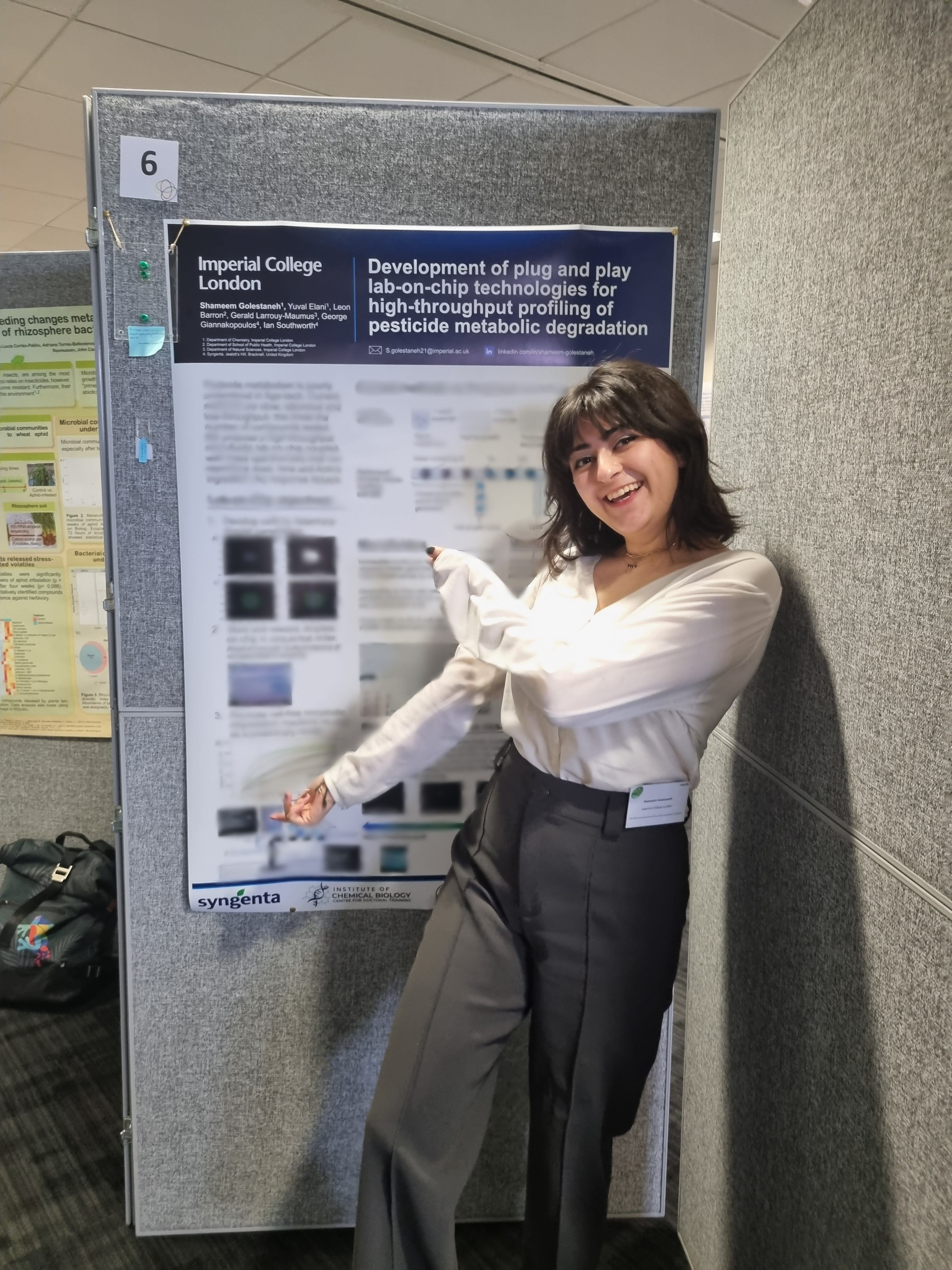 Name
Name
Shameem Golestaneh (She/Her)
Project Title
Development of plug and play lab-on-chip technologies for high-throughput profiling of pesticide metabolic degradation.
Co-sponsored by the Institute of Chemical Biology EPSRC Centre for Doctoral Training and Syngenta
What were you doing before enrolling in the ICB CDT Programme?
Between 2017-2021, I was studying a Master’s in Physics at the University of Warwick. During this time, I gained research experience by working on projects such as investigating Chlamydomonas under microfluidic stress with the Kantsler group and developing microfluidic methods to separate infected malarial cells from healthy red blood cells with the Charmet group. I was also involved in outreach programmes such as the UK Space Design Competition, which is a space engineering competition aimed towards GCSE and A-Level students.
Why did you choose to apply for your particular project?
I knew that I wanted to apply for a PhD at Imperial College London for a long time however, I originally wasn’t sure in what research area. Through my undergraduate degree and various research projects, I developed a curiosity for biophysics and in particular, microfluidics-based applications. I also wanted to be able to gain insight into research in industry. When I saw the title of my project online, and noticed that it was co-funded by Syngenta, I just knew I had to apply!
What are you looking forward to the most within the CDT programme?
I look forward to collaborating with industry partners, networking with people from a range of scientific backgrounds and the EVOLVE programme that the ICB CDT offers.
Please tell us a fun fact about yourself
I am fun!
 Name
Name
Abigail Iles
Project Title
Exploring the druggable NLRP3 interactome using novel ligand-directed proximity labelling chemistry
This project is co-sponsored by the Institute of Chemical Biology EPSRC Centre for Doctoral Training and Merck Sharp & Dohme (MSD)
What were you doing before enrolling in the ICB CDT Programme?
I had completed my Bachelor’s in Chemistry at the Uni of Bath before returning home to London at the onset of COVID. It was during COVID that I decided to apply for the drug discovery and development Master’s course here at Imperial. I enjoyed it so much and felt like I’d found a new path so I decided to go for the CDT ChemBio!
Why did you choose to apply for your particular project?
I chose this project because it had similarities to my Master’s project while also endeavouring into new terrain in the field of proximity labelling and target discovery. I wanted a project that would develop the skills that I had picked up at Master’s level and build on that. My project is all the more exciting because I get to collaborate with Merck Sharpe Dohme – an Industry partner. We formally catch up once a month and they assist me with my project direction and also provide any materials or facilities they can. It’s great to know that I am doing something that’s both industrially relevant as well as academically engaging.
What are you looking forward to the most within the CDT programme?
The opportunity to develop skills and do things outside of my project.
Please tell us a fun fact about yourself!
I’m a direct descendent of the guy who designed the Titanic.
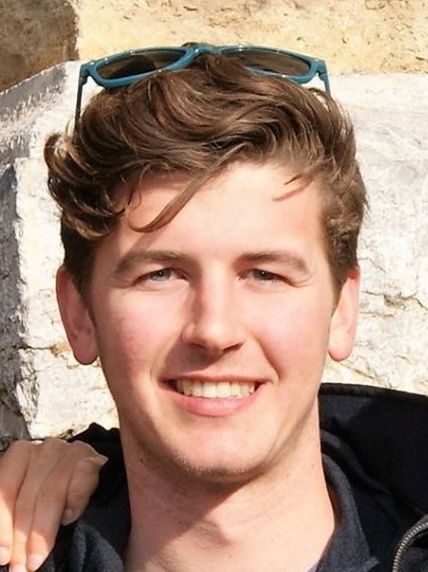 Name
Name
Thomas Maher
Project Title
Development of novel photochemical probes to investigate the quadruplex DNA interactome
What were you doing before enrolling in the ICB CDT Programme?
I completed a Master’s degree in Chemistry with a focus on synthetic organic and biological chemistry before working as a research assistant focused on identifying new cellular targets for the development of antibiotics with novel modes of action.
Why did you choose to apply for your particular project?
My interest in chemical biology stems from its unique position at the intersection of synthetic chemistry and its application in understanding biological systems and medicinal challenges. Previous experiences in research laboratories have taught me to tackle research questions in an interdisciplinary manner and solidified my desire to pursue a PhD on the ICB CDT.
What are you looking forward to the most within the CDT programme?
The ICB consists of a collaborative network spanning across numerous research groups and many departments. I look forward to this exceptional opportunity to learn from and collaborate with the research undertaken in this ICB network. Additionally, the CDT is uniquely positioned to offer training on a diverse set of skills which extend well beyond the lab, such as in scientific communication, entrepreneurship, which I have enjoyed partaking in.
Please tell us a fun fact about yourself!
I enjoy the outside.
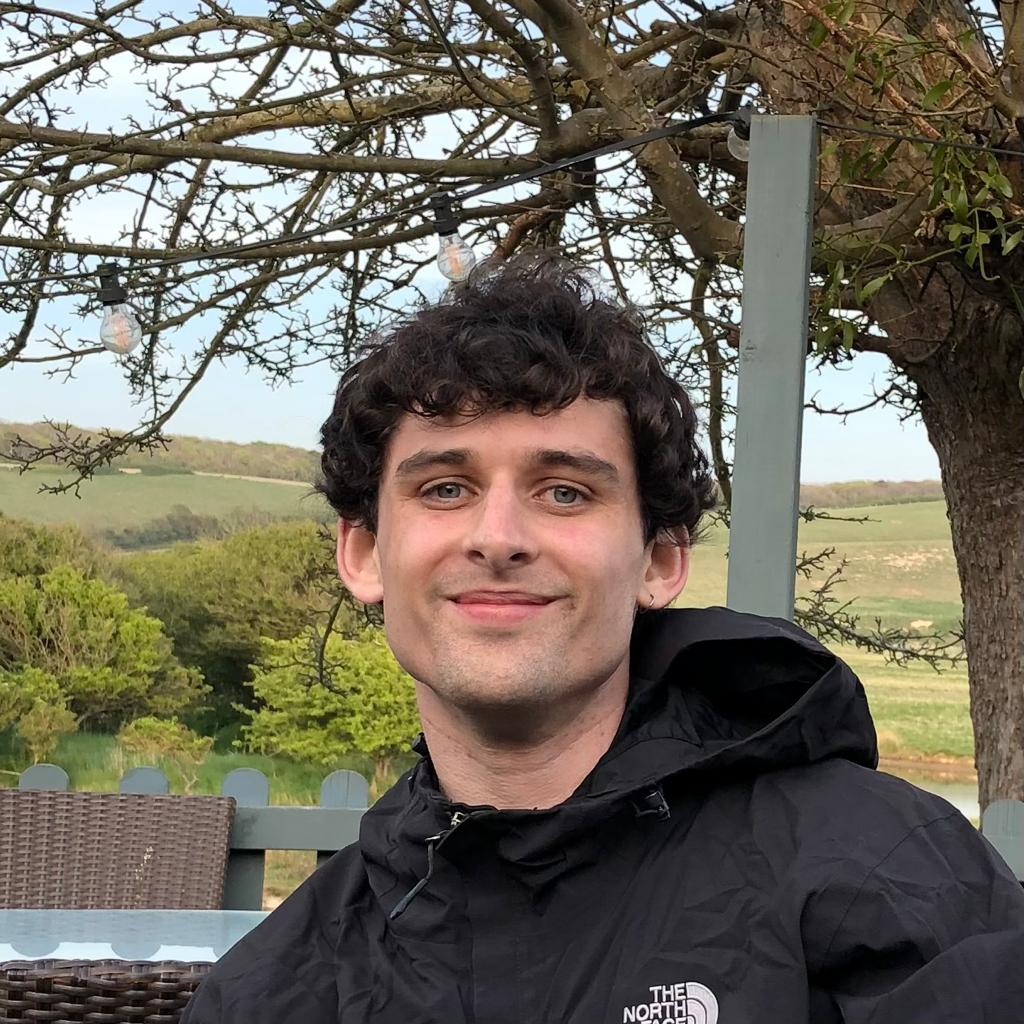 Name
Name
Niall McIntyre
Project Title
Characterising agrochemical transport to maximise efficiency and minimise environmental impact
This project is co-sponsored by the Institute of Chemical Biology, Imperial College London, and BASF SE
What were you doing before enrolling in the ICB CDT Programme?
I completed a MSci in Chemistry with Molecular Physics at Imperial, with the research project focusing on automating spectra assignment using machine learning.
Why did you choose to apply for your particular project?
This project combines my interests in biophysics and machine learning while also allowing me to develop a wide range of new skills. Also, the idea of developing translational technology to solve industrial problems, in collaboration with an external partner was exciting.
What are you looking forward to the most within the CDT programme?
I have really enjoyed annual trips to BASF in Germany to gain insight into how academic research is being translated into industry (and excellent food). Also, I have enjoyed utilising the equipment and expertise at the Advanced Hackspace to accelerate project development. Additionally, I have enjoyed collaborating with students in vastly different research areas within the CDT, combining our different expertise to drive interdisciplinary research.
Please tell us a fun fact about yourself!
I really really like football.
 Name
Name
Maya Müller
Project Title
Developing a DNA based synthetic cytoskeleton
What were you doing before enrolling in the ICB CDT Programme?
I completed an MSci in Chemistry at UCL. I also spent the third year of my degree studying at the National University of Singapore.
Why did you choose to apply for your particular project?
I applied for this project because I liked the idea of interdisciplinary research and using traditionally biological building blocks to engineer novel structural and dynamic assemblies. Through the research I carried out in my MSci, I also had a background in DNA nanotechnology and microscopy, so this project felt like a natural fit.
What are you looking forward to the most within the CDT programme?
Having already started, I am really appreciative of the CDT network and the opportunities to collaborate with research teams within the CDT and access to cutting-edge facilities in the department and beyond (e.g. Advanced Hackspace). I am also looking forward to hopefully completing an EVOLVE placement later this year.
.jpg) Name
Name
Matt White
Project Title
Novel senolytic drugs as anti-cancer therapies
This project is jointly funded by the CRUK Imperial Centre and Institute of Chemical Biology EPSRC Centre for Doctoral Training as a 4 year PhD
What were you doing before enrolling in the ICB CDT Programme?
I did a Master’s degree in Chemistry focusing on synthetic organic chemistry and then worked for ~3 years in two research assistant positions in peptide synthesis and proteomics before starting at Imperial.
Why did you choose to apply for your particular project?
I knew I wanted to work in drug discovery and the project fit really nicely at the intersection of my experiences in synthetic chemistry and proteomics. In particular, being co-funded between CRUK and the ICB CDT allowed me to sit across two labs with quite different focuses where I could learn complementary approaches/techniques - this really appealed to me.
What are you looking forward to the most within the CDT programme?
The opportunity (using the EVOLVE programme and other support) to set up an industrial placement to get some experience of scientific research in a non-academic setting.
Please tell us a fun fact about yourself!
I am an avid cold water swimmer!
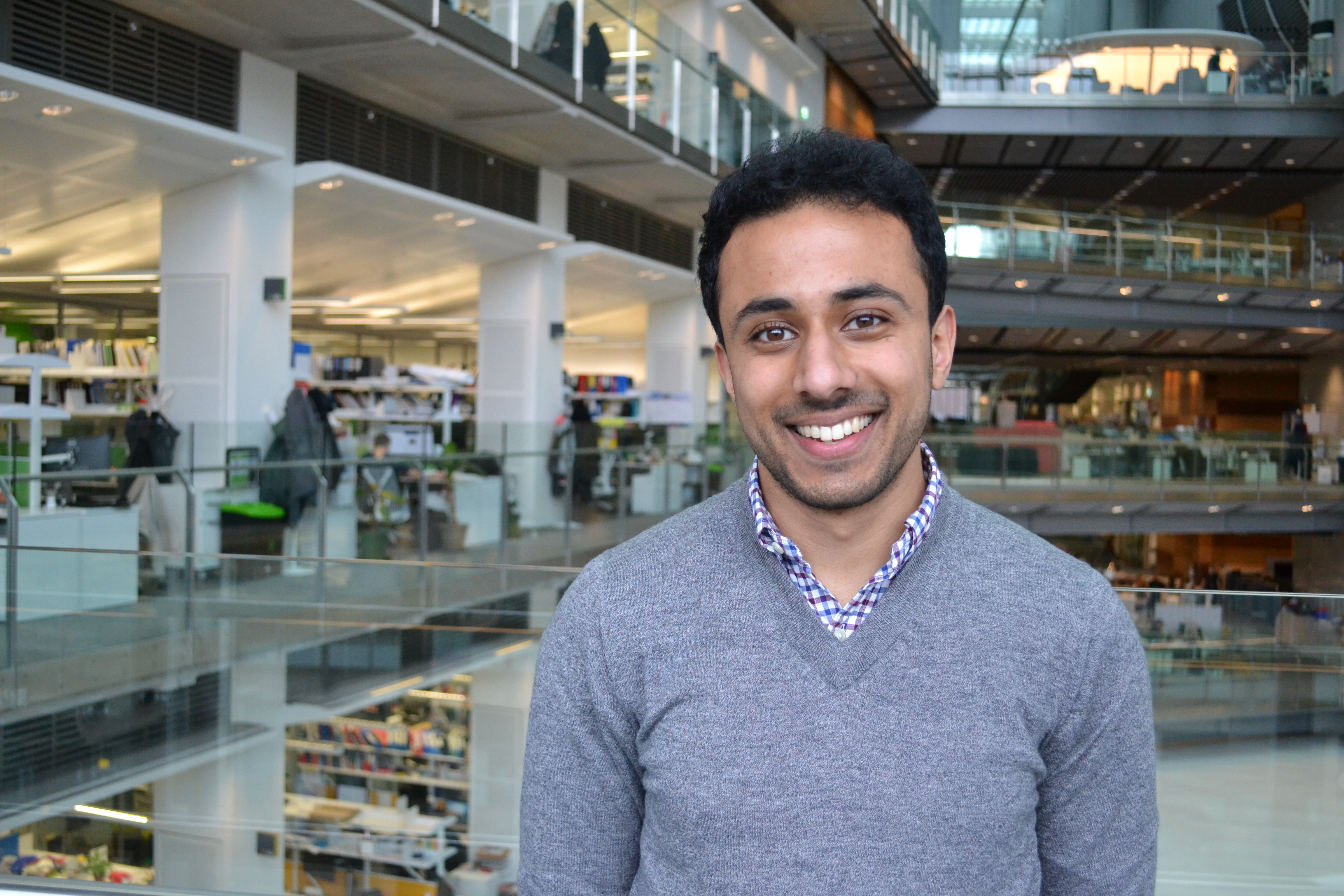 Name
Name
Abdul Zafar
Project Title
Developing a Spatio-Temporal O-Glycosylation Reporter System
This project is co-sponsored by the Institute of Chemical Biology EPSRC Centre for Doctoral Training and Vertex Pharm. Ltd. Oxford
What were you doing before enrolling in the ICB CDT Programme?
Prior to my PhD, I completed my integrated Master’s in Chemistry at Imperial. Chemistry had always been something I was interested in, but throughout the course of my degree I began to realise that my interests lay more within the application of chemistry in a biological context than in pure chemistry. I sought out Master’s projects with a biological slant, and found the chemical glycobiology lab at the Francis Crick institute. In this project, I probed the substrate specificities of particular glycosyltransferases, and found it really interesting!
Why did you choose to apply for your particular project?
After completing my Master’s in the chemical glycobiology lab, I wasn’t quite ready to leave behind glycans yet. I wanted to continue to apply what I had learned in my Master’s project, but to a more complex problem employing techniques with substantially less precedent. This has proved to be an exciting project leveraging techniques from a range of disciplines. I hope to use tools developed by the lab and create new tools to investigate the decision-making machinery behind how glycoproteins are constructed.
What are you looking forward to the most within the CDT programme?
Over the course of this programme, I have enjoyed learning a range of skills from different scientific and technical fields. These have both been applied within and outside my PhD project. Learning more about scientific communication through courses run by the CDT has been really enjoyable. I have used skills learned during the CDT programme in teaching young people from local schools, and look forward to exploring other areas in the vein of science communication.
Please tell us a fun fact about yourself!
After a failed attempt some years ago, I’m again attempting to run one half marathon a week this year!
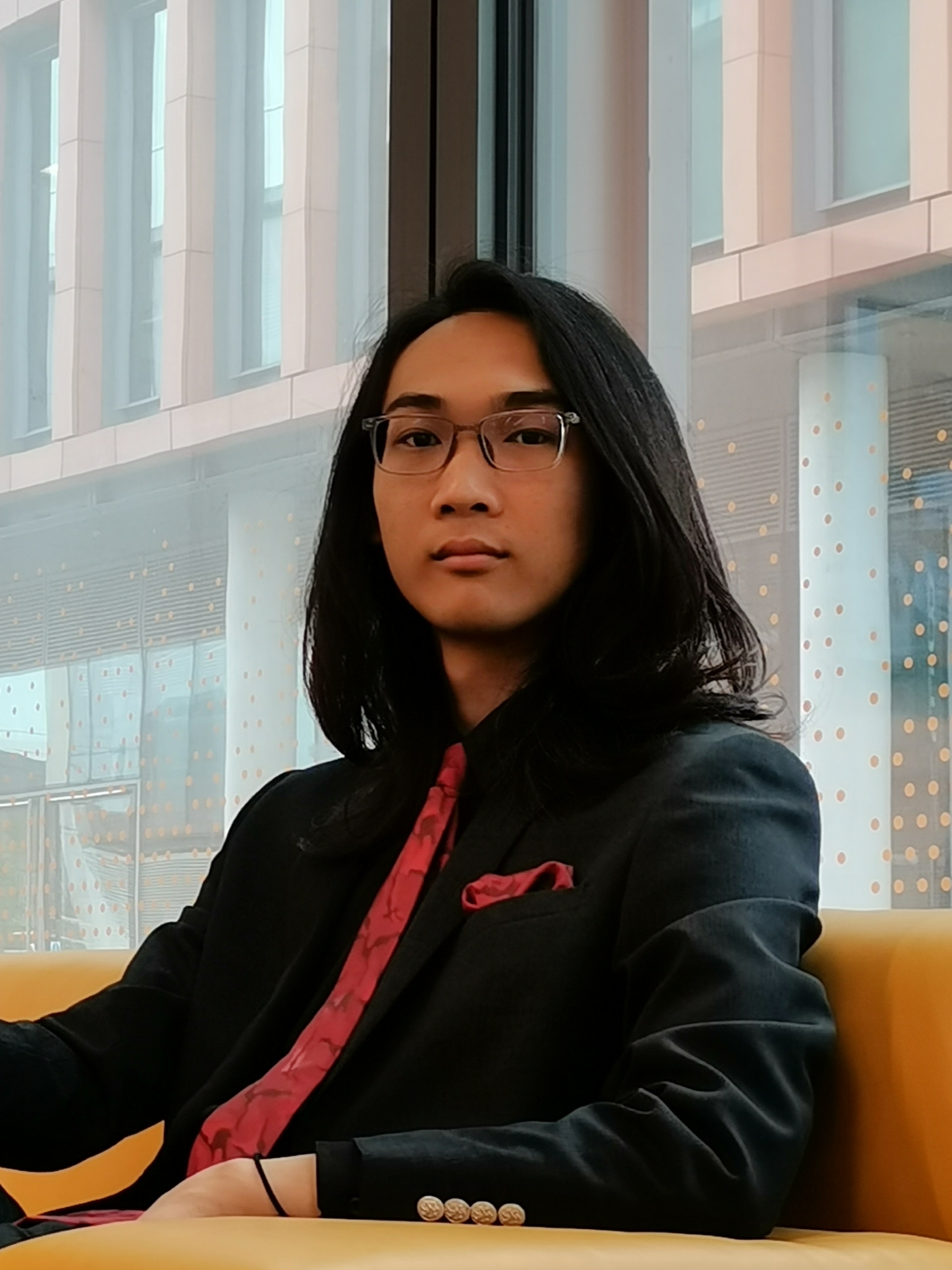 Name
Name
Yunfei Dang
Project Title
Nanotubide Electrodes for in situ EPR Investigations of Radicals in (Electro)catalysis
I am sponsored by Imperial College's President's PhD Scholarship Programme
What were you doing before enrolling in the ICB CDT Programme?
I was doing my MRes in Nanomaterials at Imperial College London.
Why did you choose to apply for your particular project?
I applied to do this project because it is a highly interdisciplinary project involving material science, electrochemistry and EPR spectroscopy. It fits to my background and the outcome can also be brought into interdisciplinary applications in investigating not only organic radicals but also semiconductors and metalloproteins.
What are you looking forward to the most within the CDT programme?
I am excited to explore my knowledge and understandings by participating the multi-aspect activities and outreaches CDT programme organised.
Please tell us a fun fact about yourself!
I do Chinese and English Calligraphy, play tennis, and like taking landscape photographs.
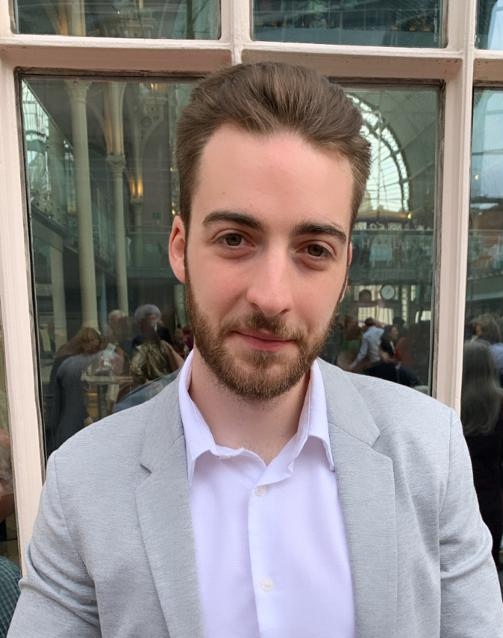 Name
Name
Davide Facchetti
Project Title
Investigation of the redox mechanism of “Methionine sulfoxide reductase PQ (MsrPQ)” with Protein Film Electrochemistry (PFE) and Electron Paramagnetic Resonance (EPR)
This project is funded by Bruker Ltd and the Department of Chemistry, Imperial College London.
What were you doing before enrolling in the ICB CDT Programme?
I am from Italy and have a MSc in "Food Science and Technology" obtained from the University of Milan, Italy, with a specialization in Industrial Biotechnology. I carried out my thesis project in Kiel, Germany, working on the characterization of beta-lactoglobulin fibrils in oil-water emulsions using spectroscopic techniques. Before starting my Ph.D., I worked as a postgraduate researcher in the Engineering Department at Lancaster University, UK. There I focused my research on developing a coating made of fibrils suited for biomedical applications.
Why did you choose to apply for your particular project?
I decided to apply for this project because it has a strong interdisciplinary component that fits well with my background.
What are you looking forward to the most within the CDT programme?
Participate in various network activities and be an active member of the community!
Please tell us a fun fact about yourself!
I like opera and ballet and cry every time!
 Name
Name
Xiaotong Lin
Project Title
Development of ultra-sensitive detection strategies to investigate toxic oligomeric species in neurodegenerative diseases
What were you doing before enrolling in the ICB CDT Programme?
Before pursuing my PhD, I completed an MRes course at IC.
Why did you choose to apply for your particular project?
I chose to apply for this project as it focuses on probing oligomers of disorder proteins, which was also part of my MRes project that I found particularly fascinating.
What are you looking forward to the most within the CDT programme?
I am most excited about the CDT program's organized events and the chance to connect with individuals who share the same passion as me.
Please tell us a fun fact about yourself!
I have completed three half-marathons.
 Name
Name
Liquan Long
Project Title
DNA origami nanostructure for nanopore sensing of biomarkers
What were you doing before enrolling in the ICB CDT Programme?
I finished my bachelor's degree at the University of Birmingham and Jinan University, and then I did the MRes program at Imperial College London.
Why did you choose to apply for your particular project?
I really enjoy dabbling in nanotechnology—it's fun and interesting. The DNA origami technique is like a cool adventure in the world of DNA nanotechnology. And nanopore sensing is an awesome method for spotting things on a super tiny scale.
What are you looking forward to the most within the CDT programme?
In the CDT, we have the chance to meet people from different groups, and it's excellent to find out what others are working on in the lab.
Please tell us a fun fact about yourself!
I am a cat person, wanna have a yard to adopt cats in the future.
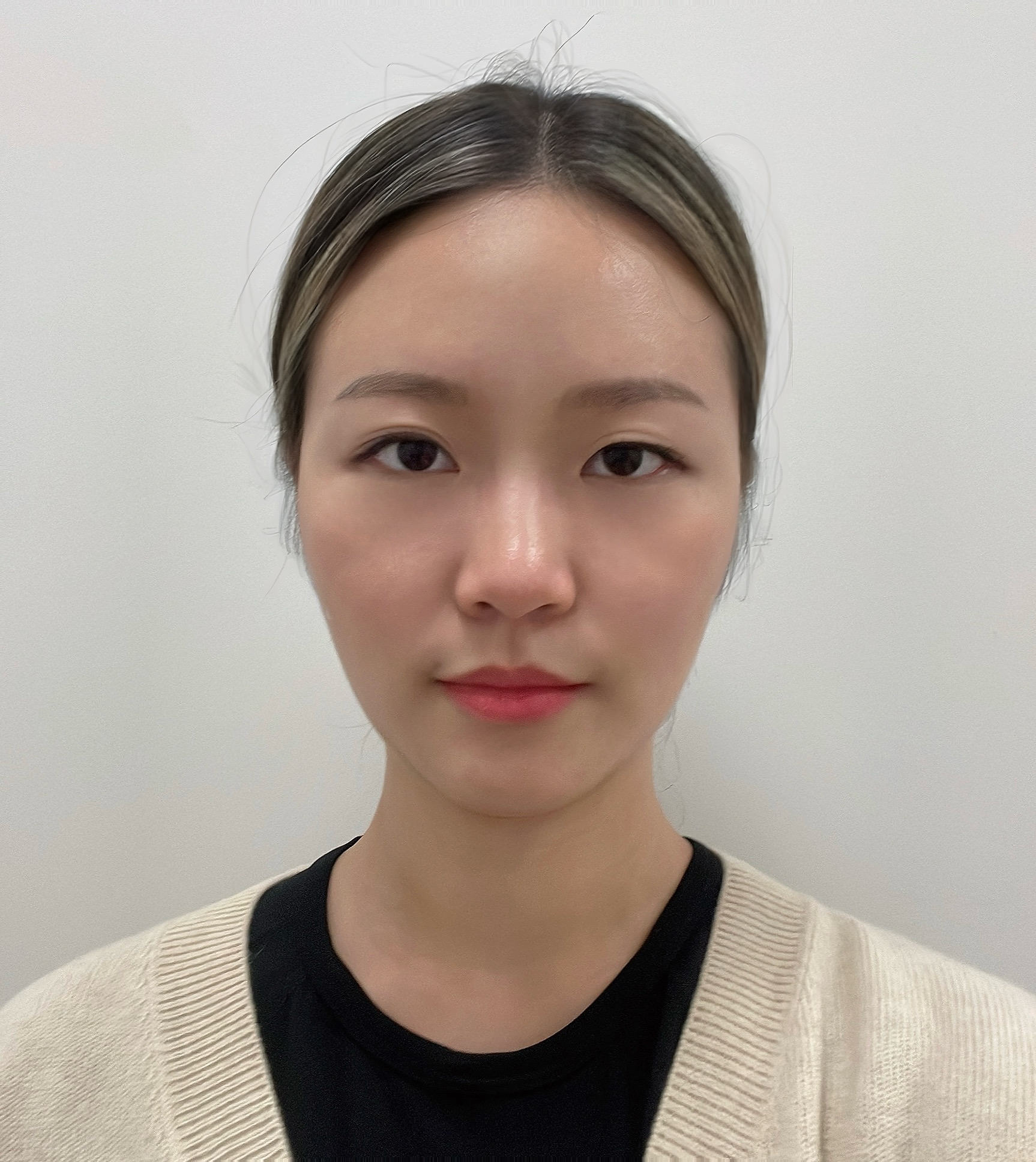 Name
Name
Suchaya (Mint) Mahuttanatan
Project Title
In-Line Protein Reconstitution via Microfluidic Technology
What were you doing before enrolling in the ICB CDT Programme?
MRes Bioengineering at Imperial College London
Why did you choose to apply for your particular project?
Membrane proteins play a crucial role in enabling drug-containing liposomes to selectively target disease areas. This principle is applicable to various targeted drug delivery systems. However, the prevailing method for producing protein-reconstituted liposomes relies on a batch process, characterized by time and labour intensiveness. The primary aim of my current project is to employ a microfluidic chip for the continuous production of protein-reconstituted liposomes, thereby significantly reducing processing time to a matter of minutes.
What are you looking forward to the most within the CDT programme?
I really like the multi-disciplinary training sessions / events / programmes that are also business-related.
Please tell us a fun fact about yourself!
I believe I am Panda.
.PNG) Name
Name
Amina Nigmatulina
Project title
Probing the role of S-acylation in biomolecular condensates.
What were you doing before enrolling in the ICB CDT Programme?
Before my PhD, I did an MRes in Drug Discovery and Development in the Tate lab at Imperial, investigating the CRISPR-Cas13 interactome using proximity labelling proteomics.
Why did you choose to apply for your particular project?
I wanted to continue my research within the drug discovery field and further specialise in proteomics, as I loved learning about it in my MRes. This project involved using proteomics and microscopy techniques to interrogate fundamental cell biology and disease mechanisms, hence perfectly aligned with my interests.
What are you looking forward to the most within the CDT programme?
I really enjoyed the Science and Communication workshop with BBC last year and am excited to attend more SciComm sessions this year!
Please tell us a fun fact about yourself!
I used to be a figure skater!
 Name
Name
Gaseitsiwe Lame Senatla
Project Title
Towards Novel Inhibitors of Hedgehog Acyltransferase
What were you doing before enrolling in the ICB CDT Programme?
I undertook my BSc in Chemistry at Imperial College London and completed a final year project using Molecular Rotors to study the effect of Sphingomyelinase in Membrane Fluidity. I stayed in Imperial to do a MRes in Drug Discovery and Development: Multidisciplinary Science for Next Generation Therapeutics, where my research project involved using a fragment-based drug discovery approach against a mitochondrial lipid transport system.
Why did you choose to apply for your particular project?
I wanted to learn to make drugs and join the community of cancer researchers around the world. I also found the balance of medicinal chemistry and chemical biology in the project attractive and knew it would offer the best of both worlds.
What are you looking forward to the most within the CDT programme?
Currently, the Human Transformation Studies retreat! I enjoy all the learning we participate in outside the research. So far, the Business Catalyst and Science Communication series have enriched my experience and are actively preparing me to complete my PhD a more well-rounded scientist!
Please tell us a fun fact about yourself!
I enjoy artistic endeavours that land me on a stage – dancing, fashion shows and especially acting!
 Name
Name
Runxin Xu
Project Title
Development of Enzyme-Responsive Nanogels for Treating Inflammatory Diseases
What were you doing before enrolling in the ICB CDT Programme?
After obtaining dual BSc degrees from the University of Edinburgh (Pharmaceutical and Biochemistry) and the East China University of Science and Technology (Applied Chemistry), I undertook an MRes course in Drug Discovery and Development at Imperial College London.
Why did you choose to apply for your particular project?
My experience in my MRes sparked my interest in using nanogels as a novel drug delivery platform, so I would like to continue this research and explore more.
What are you looking forward to the most within the CDT programme?
The CDT programme organises a lot of exciting events that allow me to meet brilliant people working in similar fields and provide me with a lot of unique experiences.
Please tell us a fun fact about yourself!
I love purple so much that I have plenty of purple items.
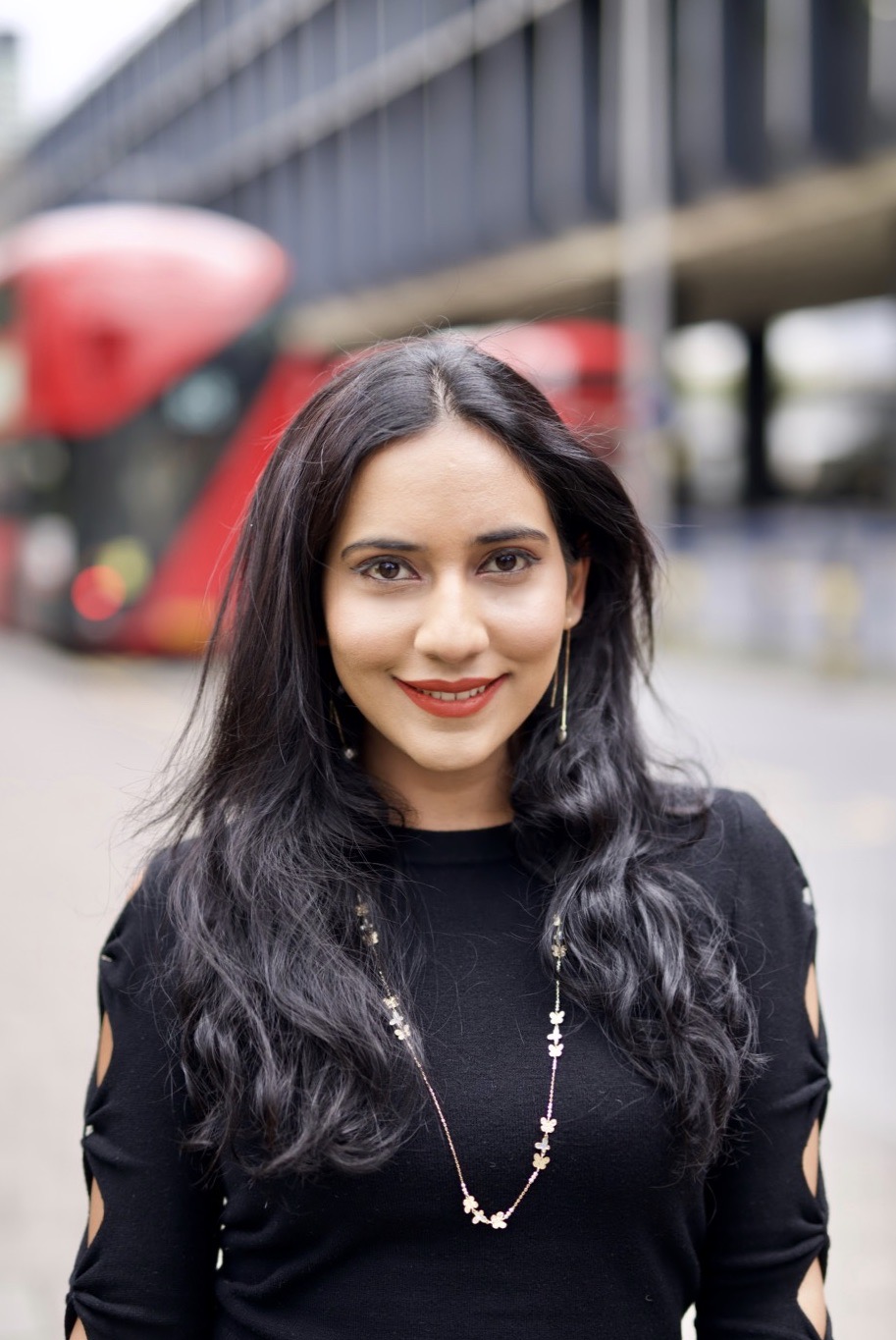 Name
Name
Shradda Vadodaria
Project Title
The Design and Discovery of Novel Covalent Inhibitors of Rab27a
What were you doing before enrolling in the ICB CDT Programme?
I completed my Master of Research in Drug Discovery and Development in Ed Tate’s lab in the fall of 2021. My research was focused on targeting a novel breast cancer target using covalent inhibitors. After this, I decided to hit the reset button and take a few months off travelling to Uganda and India to see family and friends after years of travel restrictions due to the pandemic. I started my PhD in January 2022 in the same group and project, refreshed and ready to hit the ground running!
Why did you choose to apply for your particular project?
I have always been fascinated by drug discovery campaigns and how years of breakthrough research can culminate into a life-saving drug. I love how my project marries my skills as a chemist to chemical biology allowing me the opportunity to not only synthesize potent inhibitors, but to also test them in biochemical assays and cells. I am also excited to gain experience at the interface of chemistry and biology in a highly multidisciplinary project whilst working closely with an incredibly dynamic group of researchers. More importantly, this project is a fundamental stepping stone to my aspirations of becoming a medicinal chemist who is passionate about improving the drug discovery landscape of neglected tropical diseases.
What are you looking forward to the most within the CDT programme?
I really appreciate the sense of community in the programme and all the friends I have made along the way! I am also looking forward to the CDT Den and hopefully participating this time round.
Please tell us a fun fact about yourself!
I am a kickboxer!
2021 student projects

Siân Allerton
ICB CDT: Meet our students
Project Title: Structural and pathological consequences of aSyn/lipid membrane interactions
Siân completed her MSci in Chemistry at Durham University and in her final year she completed an external masters project as part of the Koksch Group at the Freie Universität Berlin. There she focussed on the use of synthetic peptides as effective cell culture platforms. Now she is as a member of the Aprile, Kuimova, Edel and Ivanov Group and is looking at the use of fluorescence molecules, known as molecular rotors, in the in vitro detection of the formation of toxic oligomeric aggregates of alpha-synuclein, the protein associated with Parkinson’s Disease.

Sarah Chapman
ICB CDT: Meet our students
Project Title: Electrons, leaves and light: investigating surface photodegradation of agrochemicals
1st year Ph.D. student, co-funded by EPSRC and Syngenta; supervised by Maxie Roessler & Laura Barter (Imperial College London) and Ben Robinson & Claire Donaldson (Syngenta).
Sarah completed her chemistry undergraduate at the University of Manchester. In her final year she simulated DEER spectra of multi-spin [3]- and [4]- rotaxanes to predict their structures in frozen solution (supervised by Prof. E. McInnes and Dr A. Bowen). Over the course of her Ph.D., she is investigating the photodegradation of agrochemicals on model plant leaf surfaces using EPR spectroscopy. The aim of the project is for these techniques to later be used as a tool to help scientists to better understand how agrochemicals photodegrade. In her spare time, she likes to play trumpet and piano, and reads novels (when time permits)!

Amalia Chrysostomou
ICB CDT: Meet our students
Project Title: Biomimetic control of ovarian follicle development: combining multi-scale soft biomaterials with biochemical interactions
Amalia is a PhD candidate with the Institute of Chemical Biology. Prior to this, she completed a BSc in Mechanical Engineering and Manufacturing at the University of Cyprus and a MSc in Biomedical Engineering with a focus in biomaterials at Imperial College. In her project now, she aims to use previous knowledge acquired in her lab about the mechanical microenvironment of the ovary to develop a 3D culture environment for ovarian follicles under the supervision of Dr. Iain dunlop, Prof. Kate Hardy and Prof. Stephen Franks.

Thomas Maher
ICB CDT: Meet our students
Project Title: Development of novel photochemical probes to investigate quadruplex DNA interactome in livings cells
Thomas received his BA and MSci. in Natural Sciences from the University of Cambridge in 2020, completing his Master’s thesis under the supervision of Prof. Oren Scherman on developing cucurbit[8]uril-mediated supramolecular hydrogels as biomimetic extracellular matrices. Following his MSci., Thomas joined the groups of Dr. Stephan Hacker and Prof. Stephan Sieber at the Technische Universität München as a research assistant. There his research focused on using a chemoproteomic platform to investigate lysine-directed covalent inhibitors (Hacker) and identifying novel antibiotic targets for pyridoxal phosphate dependent enzymes (Sieber). In 2021, Thomas joined the ICB CDT PhD programme developing novel photochemical probes to investigate the quadruplex DNA interactome in live cells.

Xiaotong (Erin) Lin
ICB CDT: Meet our students
Project Title: Investigating neurodegenerative protein aggregation by ultra-sensitive antibody detection
Xiaotong (Erin) obtained a first-class BSc in Chemistry at King’s College London before she further explored her interest in Chemical biology and completed her MRes in Chemical biology and Bio-entrepreneurship at Imperial College London. She is currently a PhD candidate with the ICB CDT; her current project focuses on probing misfolding proteins such as Amyloid-β peptide in Alzheimer's disease, co-supervised by Dr Francesco Aprile and Professor Ramon Vilar.

Abdul Zafar
ICB CDT: Meet our students
Project Title: Caught in the act: precision tools to unravel and diagnose glycoprotein misfolding
Abdul completed his MSci in Chemistry at Imperial College London, during which he undertook a Masters project in glycobiology with Ben Schumann to probe the substrate specificities of glycosyltransferases. He then enrolled onto the ICB CDT 1+3 MRes and PhD training programme, continuing in the Schumann lab and co-supervised by David Hewings (Vertex Pharmaceuticals). In his current research, he aims to shed light on the process of protein maturation using precision chemical tools to probe glycosylation in the secretory pathway.
Date last reviewed: 29 January 2024
Date last updated: 29 January 2024

